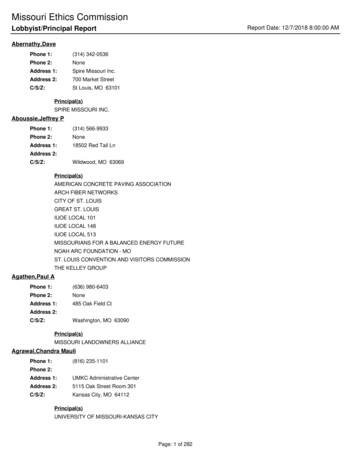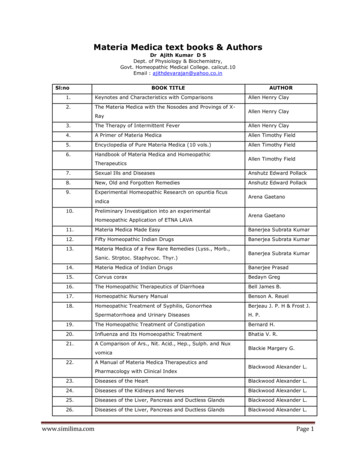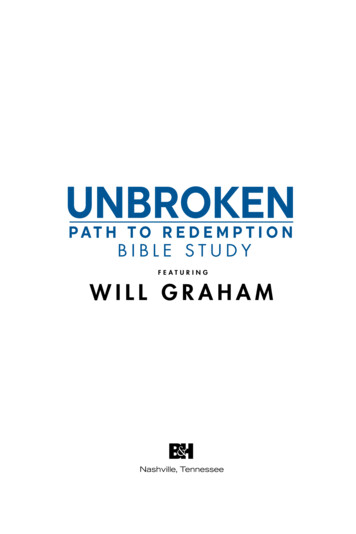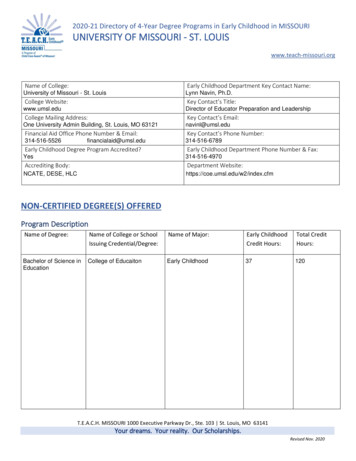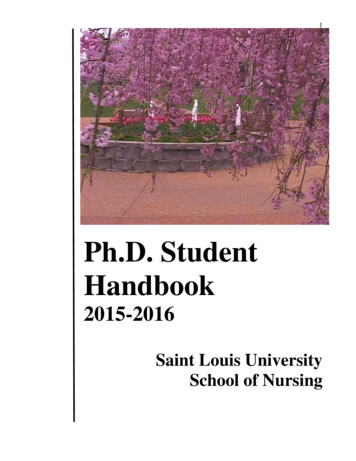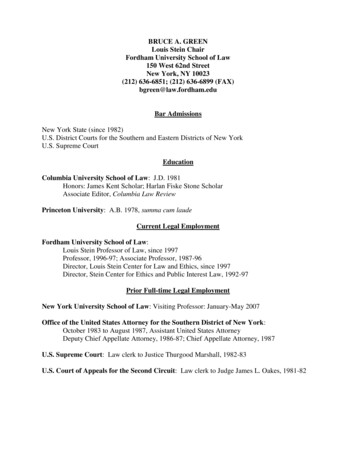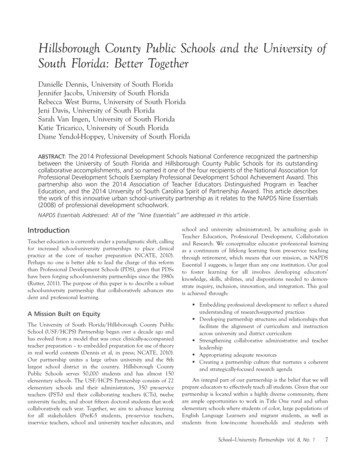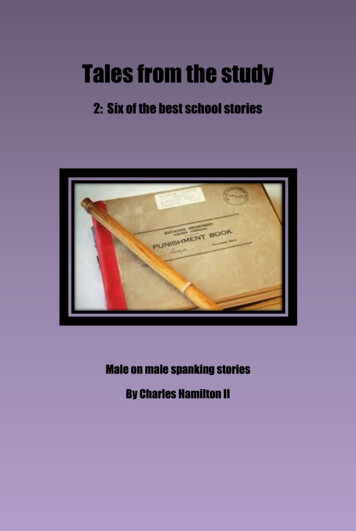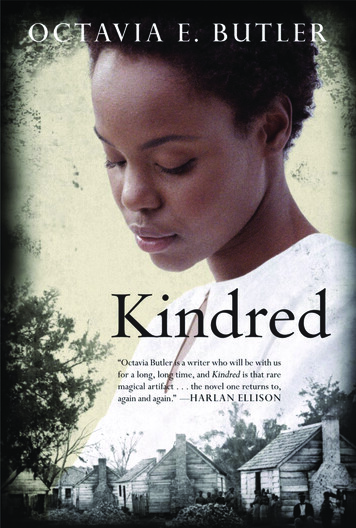
Transcription
KINDRED
KINDREDOctavia E. ButlerBEACON PRESSBOSTON
Beacon Press25 Beacon StreetBoston, Massachusetts 02108www.beacon.orgBeacon Press booksare published under the auspices ofthe Unitarian Universalist Association of Congregations. 1979 by Octavia E. ButlerReader’s Guide 2003 by Beacon PressFirst published as a hardcover by Doubleday in 1979First published as a Beacon paperback in 1988All rights reservedPrinted in the United States of America13 12 11 10 0914 13 12 11 10This book is printed on acid-free paper that meets the uncoated paperANSI/NISO specifications for permanence as revised in 1992.Library of Congress Cataloging-in-Publication DataButler, Octavia E.Kindred / Octavia E. Butler ; with an afterword by Robert Crossley.p. cm. — (Black women writers series)Includes bibliographical references.ISBN 978-0-8070-8369-7 (alk. paper)1. African American women—Fiction. 2. Los Angeles (Calif.)—Fiction. 3. Southern States—Fiction. 4. Slaveholders—Fiction. 5. Timetravel—Fiction. 6. Slavery—Fiction. 7. Slaves—Fiction. I. Title.II. Series.PS3552.U827K5 2004813'.54—dc222003062862
To Victoria Rose,friend and goad
ContentsPROLOGUE9THE RIVER12THE FIRE18THE FALL52THE FIGHT108THE STORM189THE ROPE240EPILOGUE262READER’S GUIDE265Critical Essay265Discussion Questions285
PrologueI lost an arm on my last trip home. My left arm.And I lost about a year of my life and much of the comfort and security I had not valued until it was gone. When the police released Kevin,he came to the hospital and stayed with me so that I would know I hadn’tlost him too.But before he could come to me, I had to convince the police that hedid not belong in jail. That took time. The police were shadows whoappeared intermittently at my bedside to ask me questions I had to struggle to understand.“How did you hurt your arm?” they asked. “Who hurt you?” My attention was captured by the word they used: Hurt. As though I’d scratchedmy arm. Didn’t they think I knew it was gone?“Accident,” I heard myself whisper. “It was an accident.”They began asking me about Kevin. Their words seemed to blurtogether at first, and I paid little attention. After a while, though, Ireplayed them and suddenly realized that these men were trying to blameKevin for “hurting” my arm.“No.” I shook my head weakly against the pillow. “Not Kevin. Is hehere? Can I see him?”“Who then?” they persisted.I tried to think through the drugs, through the distant pain, but therewas no honest explanation I could give them—none they would believe.“An accident,” I repeated. “My fault, not Kevin’s. Please let me seehim.”
10PROLOGUEI said this over and over until the vague police shapes let me alone,until I awoke to find Kevin sitting, dozing beside my bed. I wonderedbriefly how long he had been there, but it didn’t matter. The importantthing was that he was there. I slept again, relieved.Finally, I awoke feeling able to talk to him coherently and understandwhat he said. I was almost comfortable except for the strange throbbingof my arm. Of where my arm had been. I moved my head, tried to lookat the empty place the stump.Then Kevin was standing over me, his hands on my face turning myhead toward him.He didn’t say anything. After a moment, he sat down again, took myhand, and held it.I felt as though I could have lifted my other hand and touched him. Ifelt as though I had another hand. I tried again to look, and this time helet me. Somehow, I had to see to be able to accept what I knew was so.After a moment, I lay back against the pillow and closed my eyes.“Above the elbow,” I said.“They had to.”“I know. I’m just trying to get used to it.” I opened my eyes and lookedat him. Then I remembered my earlier visitors. “Have I gotten you intotrouble?”“Me?”“The police were here. They thought you had done this to me.”“Oh, that. They were sheriff’s deputies. The neighbors called themwhen you started to scream. They questioned me, detained me for awhile—that’s what they call it!—but you convinced them that they mightas well let me go.”“Good. I told them it was an accident. My fault.”“There’s no way a thing like that could be your fault.”“That’s debatable. But it certainly wasn’t your fault. Are you still introuble?”“I don’t think so. They’re sure I did it, but there were no witnesses, andyou won’t co-operate. Also, I don’t think they can figure out how I couldhave hurt you in the way you were hurt.”I closed my eyes again remembering the way I had been hurt—remembering the pain.“Are you all right?” Kevin asked.“Yes. Tell me what you told the police.”
PROLOGUE11“The truth.” He toyed with my hand for a moment silently. I looked athim, found him watching me.“If you told those deputies the truth,” I said softly, “you’d still belocked up—in a mental hospital.”He smiled. “I told as much of the truth as I could. I said I was inthe bedroom when I heard you scream. I ran to the living room to seewhat was wrong, and I found you struggling to free your arm from whatseemed to be a hole in the wall. I went to help you. That was when I realized your arm wasn’t just stuck, but that, somehow, it had been crushedright into the wall.”“Not exactly crushed.”“I know. But that seemed to be a good word to use on them—to showmy ignorance. It wasn’t all that inaccurate either. Then they wanted meto tell them how such a thing could happen. I said I didn’t know kepttelling them I didn’t know. And heaven help me, Dana, I don’t know.”“Neither do I,” I whispered. “Neither do I.”
The RiverThe trouble began long before June 9, 1976, when I became aware ofit, but June 9 is the day I remember. It was my twenty-sixth birthday. Itwas also the day I met Rufus—the day he called me to him for the firsttime.Kevin and I had not planned to do anything to celebrate my birthday.We were both too tired for that. On the day before, we had moved fromour apartment in Los Angeles to a house of our own a few miles away inAltadena. The moving was celebration enough for me. We were stillunpacking—or rather, I was still unpacking. Kevin had stopped when hegot his office in order. Now he was closeted there either loafing or thinking because I didn’t hear his typewriter. Finally, he came out to theliving room where I was sorting books into one of the big bookcases.Fiction only. We had so many books, we had to try to keep them in somekind of order.“What’s the matter?” I asked him.“Nothing.” He sat down on the floor near where I was working. “Juststruggling with my own perversity. You know, I had half-a-dozen ideasfor that Christmas story yesterday during the moving.”“And none now when there’s time to write them down.”“Not a one.” He picked up a book, opened it, and turned a few pages.I picked up another book and tapped him on the shoulder with it. Whenhe looked up, surprised, I put a stack of nonfiction down in front of him.He stared at it unhappily.“Hell, why’d I come out here?”
THE RIVER13“To get more ideas. After all, they come to you when you’re busy.”He gave me a look that I knew wasn’t as malevolent as it seemed. Hehad the kind of pale, almost colorless eyes that made him seem distantand angry whether he was or not. He used them to intimidate people.Strangers. I grinned at him and went back to work. After a moment, hetook the nonfiction to another bookcase and began shelving it.I bent to push him another box full, then straightened quickly as Ibegan to feel dizzy, nauseated. The room seemed to blur and darkenaround me. I stayed on my feet for a moment holding on to a bookcaseand wondering what was wrong, then finally, I collapsed to my knees. Iheard Kevin make a wordless sound of surprise, heard him ask, “Whathappened?”I raised my head and discovered that I could not focus on him. “Something is wrong with me,” I gasped.I heard him move toward me, saw a blur of gray pants and blue shirt.Then, just before he would have touched me, he vanished.The house, the books, everything vanished. Suddenly, I was outdoorskneeling on the ground beneath trees. I was in a green place. I was at theedge of a woods. Before me was a wide tranquil river, and near the middle of that river was a child splashing, screaming Drowning!I reacted to the child in trouble. Later I could ask questions, try to findout where I was, what had happened. Now I went to help the child.I ran down to the river, waded into the water fully clothed, and swamquickly to the child. He was unconscious by the time I reached him—asmall red-haired boy floating, face down. I turned him over, got a goodhold on him so that his head was above water, and towed him in. Therewas a red-haired woman waiting for us on the shore now. Or rather, shewas running back and forth crying on the shore. The moment she sawthat I was wading, she ran out, took the boy from me and carried him therest of the way, feeling and examining him as she did.“He’s not breathing!” she screamed.Artificial respiration. I had seen it done, been told about it, but I hadnever done it. Now was the time to try. The woman was in no conditionto do anything useful, and there was no one else in sight. As we reachedshore, I snatched the child from her. He was no more than four or fiveyears old, and not very big.I put him down on his back, tilted his head back, and began mouth-to-
14KINDREDmouth resuscitation. I saw his chest move as I breathed into him. Then,suddenly, the woman began beating me.“You killed my baby!” she screamed. “You killed him!”I turned and managed to catch her pounding fists. “Stop it!” I shouted,putting all the authority I could into my voice. “He’s alive!” Was he? Icouldn’t tell. Please God, let him be alive. “The boy’s alive. Now let mehelp him.” I pushed her away, glad she was a little smaller than I was,and turned my attention back to her son. Between breaths, I saw her staring at me blankly. Then she dropped to her knees beside me, crying.Moments later, the boy began breathing on his own—breathing andcoughing and choking and throwing up and crying for his mother. If hecould do all that, he was all right. I sat back from him, feeling lightheaded, relieved. I had done it!“He’s alive!” cried the woman. She grabbed him and nearly smotheredhim. “Oh, Rufus, baby ”Rufus. Ugly name to inflict on a reasonably nice-looking little kid.When Rufus saw that it was his mother who held him, he clung to her,screaming as loudly as he could. There was nothing wrong with hisvoice, anyway. Then, suddenly, there was another voice.“What the devil’s going on here?” A man’s voice, angry and demanding.I turned, startled, and found myself looking down the barrel of thelongest rifle I had ever seen. I heard a metallic click, and I froze, thinking I was going to be shot for saving the boy’s life. I was going to die.I tried to speak, but my voice was suddenly gone. I felt sick and dizzy.My vision blurred so badly I could not distinguish the gun or the face ofthe man behind it. I heard the woman speak sharply, but I was too fargone into sickness and panic to understand what she said.Then the man, the woman, the boy, the gun all vanished.I was kneeling in the living room of my own house again several feetfrom where I had fallen minutes before. I was back at home—wet andmuddy, but intact. Across the room, Kevin stood frozen, staring at thespot where I had been. How long had he been there?“Kevin?”He spun around to face me. “What the hell how did you get overthere?” he whispered.“I don’t know.”“Dana, you ” He came over to me, touched me tentatively as though
THE RIVER15he wasn’t sure I was real. Then he grabbed me by the shoulders and heldme tightly. “What happened?”I reached up to loosen his grip, but he wouldn’t let go. He dropped tohis knees beside me.“Tell me!” he demanded.“I would if I knew what to tell you. Stop hurting me.”He let me go, finally, stared at me as though he’d just recognized me.“Are you all right?”“No.” I lowered my head and closed my eyes for a moment. I wasshaking with fear, with residual terror that took all the strength out of me.I folded forward, hugging myself, trying to be still. The threat was gone,but it was all I could do to keep my teeth from chattering.Kevin got up and went away for a moment. He came back with a largetowel and wrapped it around my shoulders. It comforted me somehow,and I pulled it tighter. There was an ache in my back and shoulders whereRufus’s mother had pounded with her fists. She had hit harder than I’drealized, and Kevin hadn’t helped.We sat there together on the floor, me wrapped in the towel and Kevinwith his arm around me calming me just by being there. After a while, Istopped shaking.“Tell me now,” said Kevin.“What?”“Everything. What happened to you? How did you how did youmove like that?”I sat mute, trying to gather my thoughts, seeing the rifle again leveledat my head. I had never in my life panicked that way—never felt so closeto death.“Dana.” He spoke softly. The sound of his voice seemed to put distance between me and the memory. But still “I don’t know what to tell you,” I said. “It’s all crazy.”“Tell me how you got wet,” he said. “Start with that.”I nodded. “There was a river,” I said. “Woods with a river runningthrough. And there was a boy drowning. I saved him. That’s how I gotwet.” I hesitated, trying to think, to make sense. Not that what had happened to me made sense, but at least I could tell it coherently.I looked at Kevin, saw that he held his expression carefully neutral. Hewaited. More composed, I went back to the beginning, to the first dizziness, and remembered it all for him—relived it all in detail. I even
16KINDREDrecalled things that I hadn’t realized I’d noticed. The trees I’d been near,for instance, were pine trees, tall and straight with branches and needlesmostly at the top. I had noticed that much somehow in the instant beforeI had seen Rufus. And I remembered something extra about Rufus’smother. Her clothing. She had worn a long dark dress that covered herfrom neck to feet. A silly thing to be wearing on a muddy riverbank. Andshe had spoken with an accent—a southern accent. Then there was theunforgettable gun, long and deadly.Kevin listened without interrupting. When I was finished, he took theedge of the towel and wiped a little of the mud from my leg. “This stuffhad to come from somewhere,” he said.“You don’t believe me?”He stared at the mud for a moment, then faced me. “You know howlong you were gone?”“A few minutes. Not long.”“A few seconds. There were no more than ten or fifteen secondsbetween the time you went and the time you called my name.”“Oh, no ” I shook my head slowly. “All that couldn’t have happenedin just seconds.”He said nothing.“But it was real! I was there!” I caught myself, took a deep breath,and slowed down. “All right. If you told me a story like this, I probably wouldn’t believe it either, but like you said, this mud came fromsomewhere.”“Yes.”“Look, what did you see? What do you think happened?”He frowned a little, shook his head. “You vanished.” He seemed tohave to force the words out. “You were here until my hand was just acouple of inches from you. Then, suddenly, you were gone. I couldn’tbelieve it. I just stood there. Then you were back again and on the otherside of the room.”“Do you believe it yet?”He shrugged. “It happened. I saw it. You vanished and you reappeared.Facts.”“I reappeared wet, muddy, and scared to death.”“Yes.”“And I know what I saw, and what I did—my facts. They’re no crazierthan yours.”
THE RIVER17“I don’t know what to think.”“I’m not sure it matters what we think.”“What do you mean?”“Well it happened once. What if it happens again?”“No. No, I don’t think ”“You don’t know!” I was starting to shake again. “Whatever it was,I’ve had enough of it! It almost killed me!”“Take it easy,” he said. “Whatever happens, it’s not going to do youany good to panic yourself again.”I moved uncomfortably, looked around. “I feel like it could happenagain—like it could happen anytime. I don’t feel secure here.”“You’re just scaring yourself.”“No!” I turned to glare at him, and he looked so worried I turned awayagain. I wondered bitterly whether he was worried about my vanishingagain or worried about my sanity. I still didn’t think he believed my story.“Maybe you’re right,” I said. “I hope you are. Maybe I’m just like a victim of robbery or rape or something—a victim who survives, but whodoesn’t feel safe any more.” I shrugged. “I don’t have a name for thething that happened to me, but I don’t feel safe any more.”He made his voice very gentle. “If it happens again, and if it’s real, theboy’s father will know he owes you thanks. He won’t hurt you.”“You don’t know that. You don’t know what could happen.” I stood upunsteadily. “Hell, I don’t blame you for humoring me.” I paused to givehim a chance to deny it, but he didn’t. “I’m beginning to feel as thoughI’m humoring myself.”“What do you mean?”“I don’t know. As real as the whole episode was, as real as I know itwas, it’s beginning to recede from me somehow. It’s becoming likesomething I saw on television or read about—like something I got second hand.”“Or like a a dream?”I looked down at him. “You mean a hallucination.”“All right.”“No! I know what I’m doing. I can see. I’m pulling away from itbecause it scares me so. But it was real.”“Let yourself pull away from it.” He got up and took the muddy towelfrom me. “That sounds like the best thing you can do, whether it was realor not. Let go of it.”
The Fire1I tried.I showered, washed away the mud and the brackish water, put on cleanclothes, combed my hair “That’s a lot better,” said Kevin when he saw me.But it wasn’t.Rufus and his parents had still not quite settled back and become the“dream” Kevin wanted them to be. They stayed with me, shadowy andthreatening. They made their own limbo and held me in it. I had beenafraid that the dizziness might come back while I was in the shower,afraid that I would fall and crack my skull against the tile or that I wouldgo back to that river, wherever it was, and find myself standing nakedamong strangers. Or would I appear somewhere else naked and totallyvulnerable?I washed very quickly.Then I went back to the books in the living room, but Kevin hadalmost finished shelving them.“Forget about any more unpacking today,” he told me. “Let’s go getsomething to eat.”“Go?”“Yes, where would you like to eat? Someplace nice for your birthday.”“Here.”“But ”
THE FIRE19“Here, really. I don’t want to go anywhere.”“Why not?”I took a deep breath. “Tomorrow,” I said. “Let’s go tomorrow.” Somehow, tomorrow would be better. I would have a night’s sleep between meand whatever had happened. And if nothing else happened, I would beable to relax a little.“It would be good for you to get out of here for a while,” he said.“No.”“Listen ”“No!” Nothing was going to get me out of the house that night if Icould help it.Kevin looked at me for a moment—I probably looked as scared as Iwas—then he went to the phone and called out for chicken and shrimp.But staying home did no good. When the food had arrived, when wewere eating and I was calmer, the kitchen began to blur around me.Again the light seemed to dim and I felt the sick dizziness. I pushedback from the table, but didn’t try to get up. I couldn’t have gotten up.“Dana?”I didn’t answer.“Is it happening again?”“I think so.” I sat very still, trying not to fall off my chair. The floorseemed farther away than it should have. I reached out for the table tosteady myself, but before I could touch it, it was gone. And the distantfloor seemed to darken and change. The linoleum tile became wood, partially carpeted. And the chair beneath me vanished.2When my dizziness cleared away, I found myself sitting on a small bedsheltered by a kind of abbreviated dark green canopy. Beside me was alittle wooden stand containing a battered old pocket knife, several marbles, and a lighted candle in a metal holder. Before me was a red-hairedboy. Rufus?The boy had his back to me and hadn’t noticed me yet. He held a stickof wood in one hand and the end of the stick was charred and smoking.
20KINDREDIts fire had apparently been transferred to the draperies at the window.Now the boy stood watching as the flames ate their way up the heavycloth.For a moment, I watched too. Then I woke up, pushed the boy aside,caught the unburned upper part of the draperies and pulled them down.As they fell, they smothered some of the flames within themselves, andthey exposed a half-open window. I picked them up quickly and threwthem out the window.The boy looked at me, then ran to the window and looked out. I lookedout too, hoping I hadn’t thrown the burning cloth onto a porch roof or toonear a wall. There was a fireplace in the room; I saw it now, too late. Icould have safely thrown the draperies into it and let them burn.It was dark outside. The sun had not set at home when I was snatchedaway, but here it was dark. I could see the draperies a story below, burning, lighting the night only enough for us to see that they were on theground and some distance from the nearest wall. My hasty act had doneno harm. I could go home knowing that I had averted trouble for the second time.I waited to go home.My first trip had ended as soon as the boy was safe—had ended just intime to keep me safe. Now, though, as I waited, I realized that I wasn’tgoing to be that lucky again.I didn’t feel dizzy. The room remained unblurred, undeniably real. Ilooked around, not knowing what to do. The fear that had followed mefrom home flared now. What would happen to me if I didn’t go backautomatically this time? What if I was stranded here—wherever herewas? I had no money, no idea how to get home.I stared out into the darkness fighting to calm myself. It was not calming, though, that there were no city lights out there. No lights at all. Butstill, I was in no immediate danger. And wherever I was, there was achild with me—and a child might answer my questions more readily thanan adult.I looked at him. He looked back, curious and unafraid. He was notRufus. I could see that now. He had the same red hair and slight build,but he was taller, clearly three or four years older. Old enough, I thought,to know better than to play with fire. If he hadn’t set fire to his draperies,I might still be at home.I stepped over to him, took the stick from his hand, and threw it into
THE FIRE21the fireplace. “Someone should use one like that on you,” I said, “beforeyou burn the house down.”I regretted the words the moment they were out. I needed this boy’shelp. But still, who knew what trouble he had gotten me into!The boy stumbled back from me, alarmed. “You lay a hand on me,and I’ll tell my daddy!” His accent was unmistakably southern, andbefore I could shut out the thought, I began wondering whether I mightbe somewhere in the South. Somewhere two or three thousand milesfrom home.If I was in the South, the two- or three-hour time difference wouldexplain the darkness outside. But wherever I was, the last thing I wantedto do was meet this boy’s father. The man could have me jailed for breaking into his house—or he could shoot me for breaking in. There wassomething specific for me to worry about. No doubt the boy could tell meabout other things.And he would. If I was going to be stranded here, I had to find out allI could while I could. As dangerous as it could be for me to stay where Iwas, in the house of a man who might shoot me, it seemed even moredangerous for me to go wandering into the night totally ignorant. Theboy and I would keep our voices down, and we would talk.“Don’t you worry about your father,” I told him softly. “You’ll haveplenty to say to him when he sees those burned draperies.”The boy seemed to deflate. His shoulders sagged and he turned to stareinto the fireplace. “Who are you anyway?” he asked. “What are youdoing here?”So he didn’t know either—not that I had really expected him to. Buthe did seem surprisingly at ease with me—much calmer than I wouldhave been at his age about the sudden appearance of a stranger in mybedroom. I wouldn’t even have still been in the bedroom. If he had beenas timid a child as I was, he would probably have gotten me killed.“What’s your name?” I asked him.“Rufus.”For a moment, I just stared at him. “Rufus?”“Yeah. What’s the matter?”I wished I knew what was the matter—what was going on! “I’m allright,” I said. “Look Rufus, look at me. Have you ever seen mebefore?”“No.”
22KINDREDThat was the right answer, the reasonable answer. I tried to makemyself accept it in spite of his name, his too-familiar face. But the childI had pulled from the river could so easily have grown into this child—in three or four years.“Can you remember a time when you nearly drowned?” I asked, feeling foolish.He frowned, looked at me more carefully.“You were younger,” I said. “About five years old, maybe. Do youremember?”“The river?” The words came out low and tentative as though he didn’tquite believe them himself.“You do remember then. It was you.”“Drowning I remember that. And you ?”“I’m not sure you ever got a look at me. And I guess it must have beena long time ago for you.”“No, I remember you now. I saw you.”I said nothing. I didn’t quite believe him. I wondered whether he wasjust telling me what he thought I wanted to hear—though there was noreason for him to lie. He was clearly not afraid of me.“That’s why it seemed like I knew you,” he said. “I couldn’t remember—maybe because of the way I saw you. I told Mama, and she said Icouldn’t have really seen you that way.”“What way?”“Well with my eyes closed.”“With your—” I stopped. The boy wasn’t lying; he was dreaming.“It’s true!” he insisted loudly. Then he caught himself, whispered,“That’s the way I saw you just as I stepped in the hole.”“Hole?”“In the river. I was walking in the water and there was a hole. I fell,and then I couldn’t find the bottom any more. I saw you inside a room. Icould see part of the room, and there were books all around—more thanin Daddy’s library. You were wearing pants like a man—the way you arenow. I thought you were a man.”“Thanks a lot.”“But this time you just look like a woman wearing pants.”I sighed. “All right, never mind that. As long as you recognize me asthe one who pulled you out of the river ”“Did you? I thought you must have been the one.”
THE FIRE23I stopped, confused. “I thought you remembered.”“I remember seeing you. It was like I stopped drowning for a whileand saw you, and then started to drown again. After that Mama was there,and Daddy.”“And Daddy’s gun,” I said bitterly. “Your father almost shot me.”“He thought you were a man too—and that you were trying to hurtMama and me. Mama says she was telling him not to shoot you, and thenyou were gone.”“Yes.” I had probably vanished before the woman’s eyes. What hadshe thought of that?“I asked her where you went,” said Rufus, “and she got mad and saidshe didn’t know. I asked her again later, and she hit me. And she neverhits me.”I waited, expecting him to ask me the same question, but he said nomore. Only his eyes questioned. I hunted through my own thoughts for away to answer him.“Where do you think I went, Rufe?”He sighed, said disappointedly, “You’re not going to tell me either.”“Yes I am—as best I can. But answer me first. Tell me where you thinkI went.”He seemed to have to decide whether to do that or not. “Back to theroom,” he said finally. “The room with the books.”“Is that a guess, or did you see me again?”“I didn’t see you. Am I right? Did you go back there?”“Yes. Back home to scare my husband almost as much as I must havescared your parents.”“But how did you get there? How did you get here?”“Like that.” I snapped my fingers.“That’s no answer.”“It’s the only answer I’ve got. I was at home; then suddenly, I was herehelping you. I don’t know how it happens—how I move that way—orwhen it’s going to happen. I can’t control it.”“Who can?”“I don’t know. No one.” I didn’t want him to get the idea that he couldcontrol it. Especially if it turned out that he really could.“But what’s it like? What did Mama see that she won’t tell meabout?”“Probably the same thing my husband saw. He said when I came to
24KINDREDyou, I vanished. Just disappeared. And then reappeared later.”He thought about that. “Disappeared? You mean like smoke?” Fearcrept into his expression. “Like a ghost?”“Like smoke, maybe. But don’t go getting the idea that I’m a ghost.There are no ghosts.”“That’s what Daddy says.”“He’s right.”“But Mama says she saw one once.”I managed to hold back my opinion of that. His mother, after all Besides, I was probably her ghost. She had had to find some explanationfor my vanishing. I wondered how her more realistic husband hadexplained it. But that wasn’t important. What I cared about now waskeeping the boy calm.“You needed help,” I told him. “I came to help you. Twice. Does thatmake me someone to be afraid of?”“I guess not.” He gave me a long look, then came over to me, reachedout hesitantly, and touched me with a sooty hand.“You see,” I said, “I’m as real as you are.”He nodded. “I thought you were. All the things you did you had tobe. And Mama said she touched you too.”“She sure did.” I rubbed my shoulder where the woman had bruised itwith her desperate blows. For a moment, the soreness confused me, forcedme to recall that for me, the woman’s attack had come only hours ago. Yetthe boy was years older. Fact then: Somehow, my travels crossed time aswell as distance. Another fact: The boy was the focus of my travels—perhaps the cause of them. He had seen me in my living room before Iwas drawn to him; he couldn’t have made that up. But I had seen nothingat all, felt nothing but sickness and disorientation.“Mama said what you did after you got me out of the water was likethe Second Book of Kings,” said the boy.“The what?”“Where Elisha breathed into the dead boy’s mouth, and the boy cameback to life. Mama said she tried to stop you when she saw you doingthat to me because you were just some nigger she had never seen before.Then she remembered Second Kings.”I sat down on the
“Not a one.” He picked up a book, opened it, and turned a few pages. I picked up another book and tapped him on the shoulder with it. When he looked up, surprised, I put a stack of nonfiction down in front of him. He
